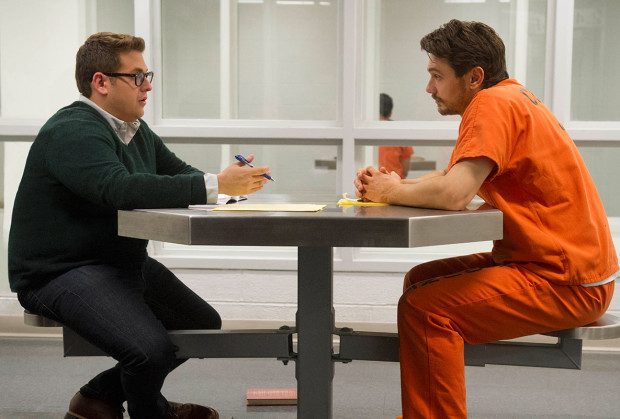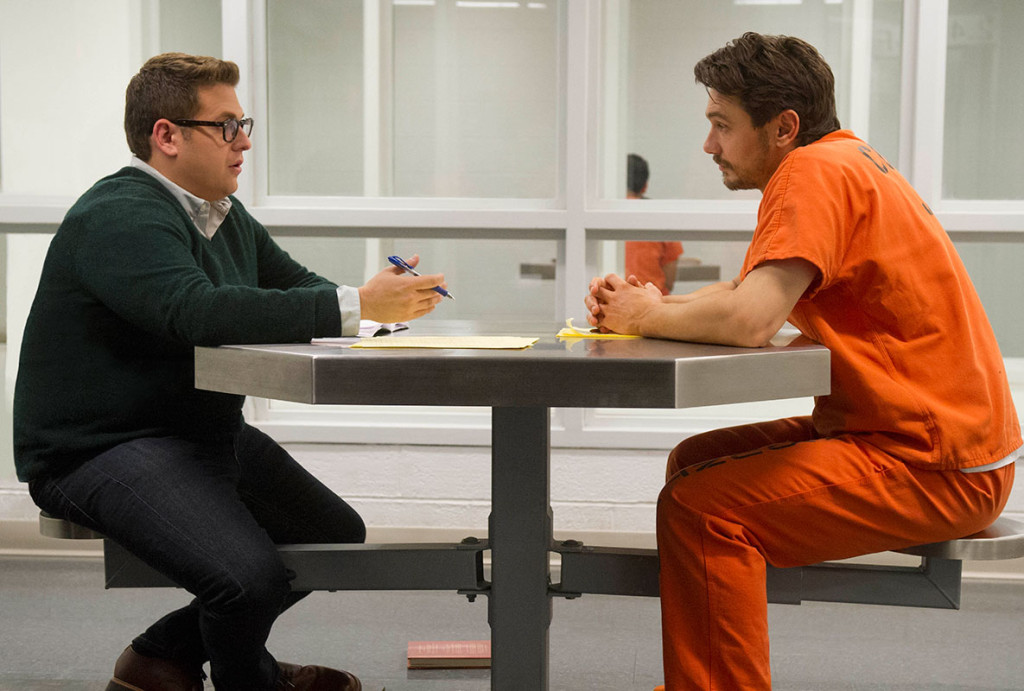The last time James Franco and Jonah Hill were in a movie together, 2013’s This is the End, Hill got a Satanic cock up the ass and Franco was munched to death by self-appointed cannibal king Danny McBride. Franco and Hill trade up in the respectability index for True Story, a flat cat-and-mouse two-hander based on the ‘true story’ of Christian Longo, wanted by the FBI in 2002 for the murder of his family, and the disgraced journalist who wrote a book about him.
Hill is Michael Finkel, an ambitious New York Times reporter who is fired for embellishing a cover story on modern slavery and banished to the oblivion of chilly Montana with his library archivist wife (Felicity Jones). There, he gets a call about Longo who, when he was apprehending in Mexico by the authorities two days after the bodies of his wife and children were discovered, claimed to be a Times reporter named Finkel. Longo, bored in county jail waiting for his trial to begin, offers his new friend exclusive access to his side of the story. For Finkel, it’s an irresistible scoop and career second chance, but raises questions of ethics and co-dependence — questions which are addressed in the vaguest and most superficial terms. The longer the film goes on, the more unsure it is about what it’s supposed to be doing.
As Longo and Finkel spend more and more time together – Finkel angling for juicy details for the book behind the movie, Longo for a gullible or sympathetic ear – the film moves issues of credibility to the centre. How much of Longo’s story should the chastised reporter believe? And how much will the media world trust Finkel after his casual approach to professional accuracy? But the credibility question applies to the film itself, eventually sinking it. Hill and Franco have a solid rapport, but they struggle to communicate moral shadiness. Franco’s drowsy drawl can’t extend to malevolence, though Hill makes more sense as a self-centred hack, even if Rupert Goold and David Kajganich’s screenplay overplays his screen reporter chic (glasses, notebooks, toe-curling workplace banter).
To be fair to the actors, the screenplay gives them limited resources to work with, sketching out their partnership and conflict in broad, clunky strokes. What should be the film’s centre of suspense, the middle section in which the two men feel eachother out in eight months’ worth of interviews, writing sessions and word association experiments, is rushed and unnuanced, making it hard to care about the light twists to come. Perhaps sensing this deficit, Goold’s direction lays on the artificial moodiness, filling out time with obscure slow-motion shots of handcuffs, teddy bears or Hill and Franco doing their best Serious Faces while starting into space. Finkel, like all good film investigators, wallpapers his living room in notes, diary pages and Longo’s emo sketches, but he lives in a cabin so he has to put them up with hammer and nail. At no point does his wife tell him to just buy a binder.
In this year’s The Theory of Everything, Jones excelled in her role as the hovering wife, burdened with love and concern for a complicated husband, but she’s wasted here in a marriage that isn’t so much strained as dramatically non-existent. It’s another site of tension that remains theoretical rather than earned, cumulatively building to a third act that basically doesn’t happen. The very final exchange, on Finkel’s eventual book tour, combines two of my least favourite story tricks: sticking thematic points in the mouths of characters rather than building them organically and using silence as a cheap gesture to thoughtful ambiguity. ‘Christian Longo lost his freedom, but what did you lose?’ asks a book fan. Finkel stares blankly back and we cut to black, because he’s got nothing to say. Conor Smyth






